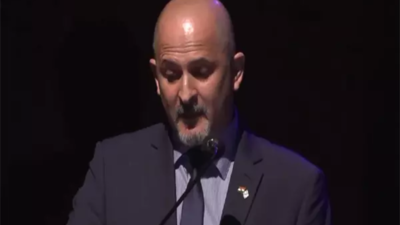NEW DELHI: On the occasion of International Holocaust remembrance day, Fares Saeb, deputy ambassador of Israel to India, delivered a poignant address, reflecting on the Holocaust and cautioning against the alarming resurgence of anti-semitism globally.
“Jacqueline, born in 1940 in France, suffered immense personal losses, losing her father, grandparents, and other family members at Auschwitz. Approximately 78,000 Jews were deported from occupied France to concentration camps, with most never returning. Six million Jews never returned from the death camps,” Saeb said.
He marked the liberation of Auschwitz, 80 years ago, as the conclusion of “a systematic death machine that killed more than one million people.” He referenced Elie Wiesel’s speech on the 50th anniversary of Auschwitz’s liberation, stating: “After Auschwitz, the human condition is not the same. Nothing will be the same. Here heaven and earth are on fire. I speak to you as a man who, 50 years and 9 days ago, had no name, no hope, no future, and was known only by his number 7713.”
Reflecting on his own experiences, Saeb shared, “I remember as a child during the shoah memorial, my mother would ask us to stand in silence during the siren. Once I asked her why we are not Jewish, and shoah, did it happen to us? She replied, ‘If you don’t respect and remember this day, it will happen again, even to us.'”
He warned of the rising tide of anti-Semitism in recent years, fuelled by various sources. “We have witnessed the rise of anti-Semitism in various countries and the emergence of new forms of hatred against Jews. This includes hatred stemming from radical Islamism and anti- semitism that masquerades as anti-Israel or anti-zionism. Since the October 7 massacre, the largest single-day pogrom against Jews since the shoah, we have seen these three forms of hatred uniting, feeding off each other, and being fuelled by individuals, organisations, and even countries.”
Saeb highlighted the role of social media and technology in spreading these ideologies. “Using social media and emerging technologies such as AI and deep fake as tools to spread radical ideologies and ideas influences especially the young generation,” he said. He also criticised the global reluctance to address anti-semitism. “Many prefer to view anti-semitism as a jewish or Israeli problem rather than confronting the radicalisation within their own societies. I believe that radicalisation is a global threat, and one of its outcomes is anti-semitism, and we must face it together.”
Citing a recent study, Saeb revealed shocking statistics about the surge in anti-semitic content online following the October 7 attacks. “A recent research study from George Washington University by Omar Mohammed and Vered Andre found that after the October 7 attacks there was a significant surge in anti-semitic content online, especially on platforms like X and TikTok. The narrative shifted towards violent rhetoric, Holocaust denial, and dehumanising stereotypes.”
He added, “The study identified constant themes such as ‘Jews are the enemies,’ religiously rooted anti-semitism, and zionist domination narratives with motives like the ‘Protocols of the Elders of Zion’ re-emerging. Platform-specific trends show TikTok with the highest percentage increase in anti-Semitic posts, while X had the highest overall volume.”
Saeb connected this online surge to real-world violence. “In the wake of the October 7 massacre, more than 96 per cent of Jews in Europe report encountering anti-Semitic sentiments in their daily lives. The European Union agency for fundamental rights has documented a staggering 400 per cent rise in anti-semitic activities since the outbreak of the war.”
He concluded with a chilling reminder of slogans like “Death to America, death to Israel, curses be upon the Jews,” chanted by groups like the Iranian-affiliated Houthis, and the phrase “from the river to the sea,” heard in protests worldwide. “If we don’t combat radicalisation and anti-semitism, the Holocaust won’t remain a past event we remember and learn from, but a reality we will have to face. Never again is now.”




